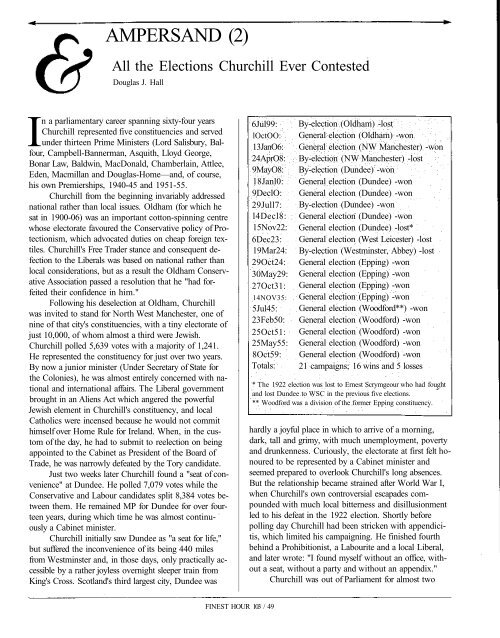.JOURNAL OFTIIE CHURCHILL CKNTER AND ... - Winston Churchill
.JOURNAL OFTIIE CHURCHILL CKNTER AND ... - Winston Churchill
.JOURNAL OFTIIE CHURCHILL CKNTER AND ... - Winston Churchill
- No tags were found...
You also want an ePaper? Increase the reach of your titles
YUMPU automatically turns print PDFs into web optimized ePapers that Google loves.
AMPERS<strong>AND</strong> (2)All the Elections <strong>Churchill</strong> Ever ContestedDouglas J. HallIn a parliamentary career spanning sixty-four years<strong>Churchill</strong> represented five constituencies and servedunder thirteen Prime Ministers (Lord Salisbury, Balfour,Campbell-Bannerman, Asquith, Lloyd George,Bonar Law, Baldwin, MacDonald, Chamberlain, Attlee,Eden, Macmillan and Douglas-Home—and, of course,his own Premierships, 1940-45 and 1951-55.<strong>Churchill</strong> from the beginning invariably addressednational rather than local issues. Oldham (for which hesat in 1900-06) was an important cotton-spinning centrewhose electorate favoured the Conservative policy of Protectionism,which advocated duties on cheap foreign textiles.<strong>Churchill</strong>'s Free Trader stance and consequent defectionto the Liberals was based on national rather thanlocal considerations, but as a result the Oldham ConservativeAssociation passed a resolution that he "had forfeitedtheir confidence in him."Following his deselection at Oldham, <strong>Churchill</strong>was invited to stand for North West Manchester, one ofnine of that city's constituencies, with a tiny electorate ofjust 10,000, of whom almost a third were Jewish.<strong>Churchill</strong> polled 5,639 votes with a majority of 1,241.He represented the constituency for just over two years.By now a junior minister (Under Secretary of State forthe Colonies), he was almost entirely concerned with nationaland international affairs. The Liberal governmentbrought in an Aliens Act which angered the powerfulJewish element in <strong>Churchill</strong>'s constituency, and localCatholics were incensed because he would not commithimself over Home Rule for Ireland. When, in the customof the day, he had to submit to reelection on beingappointed to the Cabinet as President of the Board ofTrade, he was narrowly defeated by the Tory candidate.Just two weeks later <strong>Churchill</strong> found a "seat of convenience"at Dundee. He polled 7,079 votes while theConservative and Labour candidates split 8,384 votes betweenthem. He remained MP for Dundee for over fourteenyears, during which time he was almost continuouslya Cabinet minister.<strong>Churchill</strong> initially saw Dundee as "a seat for life,"but suffered the inconvenience of its being 440 milesfrom Westminster and, in those days, only practically accessibleby a rather joyless overnight sleeper train fromKing's Cross. Scotland's third largest city, Dundee was6Jul99:lOctOO:13JanO6:24AprO8:9MayO8:18Janl0:9DeclO:29Jull7:l4Decl8:15Nov22:6Dec23:19Mar24:29Oct24:30May29:27Oct31:14NOV35:5Jul45:23Feb50:25Oct51:25May55:8Oct59:Totals:By-election (Oldham) -lostGeneral election (Oldham) -wonGeneral election (NW Manchester) -wonBy-election (NW Manchester) -lostBy-election (Dundee) -wonGeneral election (Dundee) -wonGeneral election (Dundee) -wonBy-election (Dundee) -wonGeneral election (Dundee) -wonGeneral election (Dundee) -lost*General election (West Leicester) -lostBy-election (Westminster, Abbey) -lostGeneral election (Epping) -wonGeneral election (Epping) -wonGeneral election (Epping) -wonGeneral election (Epping) -wonGeneral election (Woodford**) -wonGeneral election (Woodford) -wonGeneral election (Woodford) -wonGeneral election (Woodford) -wonGeneral election (Woodford) -won21 campaigns; 16 wins and 5 losses* The 1922 election was lost to Ernest Scrymgeour who had foughtand lost Dundee to WSC in the previous five elections.** Woodford was a division of the former Epping constituency.hardly a joyful place in which to arrive of a morning,dark, tall and grimy, with much unemployment, povertyand drunkenness. Curiously, the electorate at first felt honouredto be represented by a Cabinet minister andseemed prepared to overlook <strong>Churchill</strong>'s long absences.But the relationship became strained after World War I,when <strong>Churchill</strong>'s own controversial escapades compoundedwith much local bitterness and disillusionmentled to his defeat in the 1922 election. Shortly beforepolling day <strong>Churchill</strong> had been stricken with appendicitis,which limited his campaigning. He finished fourthbehind a Prohibitionist, a Labourite and a local Liberal,and later wrote: "I found myself without an office, withouta seat, without a party and without an appendix."<strong>Churchill</strong> was out of Parliament for almost twoFINEST HOUR 103 / 49

















